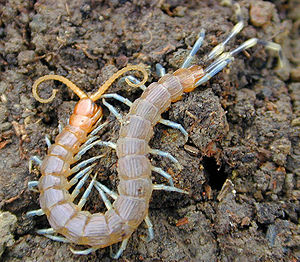탈피동물
탈피동물(脫皮動物)은 절지동물(곤충, 갑각류, 다족류)과 선형동물, 그리고 몇 개의 문을 포함하는 선구동물의 무리이다. 1997년에 아기날도에 의해, 18S 리보솜 RNA 유전자를 이용하여 구성된 분류 체계에 기반을 두고, 처음으로 정의되었다.[1] 던(Dunn)에 의한 2008년의 대규모 연구는 자연적 그룹핑으로써 탈피동물을 강력하게 뒷받침했다.[2]
|
| ||
|---|---|---|
 지네 | ||
| 생물 분류ℹ️ | ||
| 계: | 동물계 | |
| 아계: | 진정후생동물아계 | |
| 상문: | 탈피동물상문(Ecdysozoa) Aguinaldo et al., 1997 | |
| 문 | ||
| ||
계통 분류
편집다음은 선구동물의 계통 분류이다.[3][4][5][6][7][8][9][6]
| 선구동물 |
| |||||||||||||||||||||||||||||||||||||||||||||||||||||||||||||||||||||||||||
| 탈피동물 |
| ||||||||||||||||||||||||||||||||||||||||||
각주
편집- ↑ Aguinaldo, A. M. A.; J. M. Turbeville, L. S. Linford, M. C. Rivera, J. R. Garey, R. A. Raff, & J. A. Lake (1997). “Evidence for a clade of nematodes, arthropods and other moulting animals”. 《Nature》 387: 489–493. doi:10.1038/387489a0.
- ↑ Dunn; 외. (2008). “Broad phylogenomic sampling improves resolution of the animal tree of life”. 《Nature》 452: 745–749. doi:10.1038/nature06614.
- ↑ Edgecombe, Gregory D.; Giribet, Gonzalo; Dunn, Casey W.; Hejnol, Andreas; Kristensen, Reinhardt M.; Neves, Ricardo C.; Rouse, Greg W.; Worsaae, Katrine; Sørensen, Martin V. (June 2011). “Higher-level metazoan relationships: recent progress and remaining questions”. 《Organisms, Diversity & Evolution》 11 (2): 151–172. doi:10.1007/s13127-011-0044-4.
- ↑ Fröbius, Andreas C.; Funch, Peter (2017년 4월 4일). “Rotiferan Hox genes give new insights into the evolution of metazoan bodyplans”. 《Nature Communications》 8 (1). Bibcode:2017NatCo...8....9F. doi:10.1038/s41467-017-00020-w.
- ↑ Smith, Martin R.; Ortega-Hernández, Javier (2014). “Hallucigenia’s onychophoran-like claws and the case for Tactopoda”. 《Nature》 514 (7522): 363–366. Bibcode:2014Natur.514..363S. doi:10.1038/nature13576.
- ↑ 가 나 “Palaeos Metazoa: Ecdysozoa”. 《palaeos.com》. 2017년 9월 2일에 확인함.
- ↑ Yamasaki, Hiroshi; Fujimoto, Shinta; Miyazaki, Katsumi (June 2015). “Phylogenetic position of Loricifera inferred from nearly complete 18S and 28S rRNA gene sequences”. 《Zoological Letters》 1: 18. doi:10.1186/s40851-015-0017-0.
- ↑ Nielsen, C. (2002). 《Animal Evolution: Interrelationships of the Living Phyla》 2판. Oxford University Press. ISBN 0-19-850682-1.
- ↑ “Bilateria”. 《Tree of Life Web Project》. 2001. 2014년 8월 11일에 확인함.
- ↑ Nielsen, Claus; Brunet, Thibaut; Arendt, Detlev (2018년 8월 22일). “Evolution of the bilaterian mouth and anus”. 《Nature Ecology & Evolution》 2 (9): 1358–1376. Bibcode:2018NatEE...2.1358N. doi:10.1038/s41559-018-0641-0. ISSN 2397-334X. PMID 30135501. S2CID 52067372.
- ↑ Howard, Richard J.; Giacomelli, Mattia; Lozano-Fernandez, Jesus; Edgecombe, Gregory D.; Fleming, James F.; Kristensen, Reinhardt M.; 외. (10 March 2022). “The Ediacaran origin of Ecdysozoa: Integrating fossil and phylogenomic data”. 《Journal of the Geological Society》 179 (4). Bibcode:2022JGSoc.179..107H. doi:10.1144/jgs2021-107. hdl:2445/186596. ISSN 0016-7649. S2CID 246494357.
외부 링크
편집- 위키생물종에 Ecdysozoa 관련 자료가 있습니다.